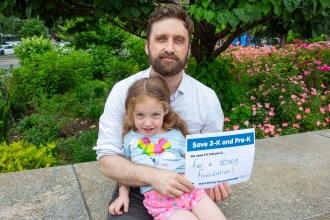The building blocks of success

Paraprofessional Brenda Mercado joins in with her 3-K students during a dance class.

Teacher Jennifer Cruz checks in on a student playing with blocks during center time.
“Mommy, listen. Do you hear it? I hear a clarinet.”
Teresa Valerio, the UFT chapter leader at Little Brooklyn Pre-K Center, was taken aback to hear her 3-year-old daughter start identifying instruments in the song on the radio. But then she remembered her daughter’s 3-K class had recently covered a music-making unit.
Valerio’s daughter, along with 13 other 3- and 4-year-olds, have learned about music, shapes, patterns, clothing design, animals and more in this free early-childhood program.
“In kindergarten, as soon as they get to the classroom, they’re taking tests, learning how to read and write and formulate mathematical problems. It’s work, work, work,” said Jennifer Cruz, a 3-K teacher at Little Brooklyn. Pre-K and 3-K provide crucial kindergarten readiness skills like following a schedule, communicating verbally and developing fine motor skills like holding a pencil.
By learning these skills in a developmentally appropriate classroom setting, Little Brooklyn educators say they lay the groundwork for greater achievement in the elementary school years and beyond.
3-K, in particular, builds a “solid foundation” of social and emotional skills, said Brenda Mercado, a paraprofessional who works alongside Cruz. “This might be their first time leaving their families.”
Cruz notes that 3-K students need a lot of emotional support as they navigate the world of a classroom on their own. “The most important thing is to make them feel safe,” she said.
Part of how 3-K educators make students feel safe while promoting learning is through play. Students spend about half the instructional day playing at the classroom’s centers, which hold blocks for building and counting, sand and water for scooping and pouring, arts and crafts, and a toy kitchen set or dolls for dramatic play. Students move independently among the centers, checking in with a name tag when they choose to switch to a different center.
“Doing hands-on activities is how children in this age group learn best,” explained Mercado. “With play-based learning, they build creativity, social skills, imagination and language.”
Mercado and Cruz say they see more language breakthroughs, like students speaking in full sentences for the first time, during center playtime than they do during “circle-time” instruction in large groups. They attribute it to the more relaxed and free-form nature of center activity.
3-K also builds students’ ability to follow directions and adhere to a schedule, a fundamental skill for elementary school success.
Transitioning from one activity to another is a common early childhood struggle, so 3-K teachers use short songs, countdowns and visual aids, like an interactive schedule for the day with pictures of students engaged in each classroom activity.
There is still time for classic reading, writing and arithmetic in 3-K — skills the children will focus more on in pre-K and even more in kindergarten.
Rodrigo Camarena, whose son is in Cruz and Mercado’s 3-K class, said his son has “developed a lot of really great habits” and skills, including following instructions, writing and recognizing letters, counting and recognizing shapes.
“He’ s been exposed to so many fantastic opportunities because of 3-K,” said Camarena. “I think he’ll be very well prepared for pre-K and kindergarten.”
Watching an established 3-K classroom, one might be surprised to see a group of 14 very young children articulating their thoughts and needs and cooperating with one another.
“We forget how much a 3-year-old can do,” said Valerio. “They have voices. In a classroom, they can express themselves and hear other kids’ voices. In this room, for six hours, they have each other.”
